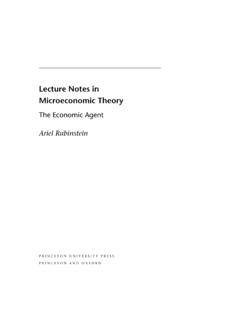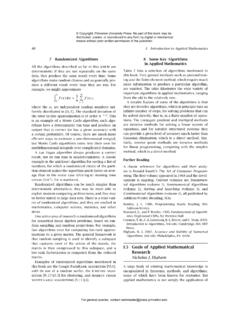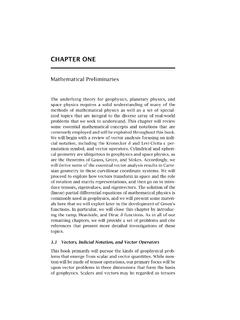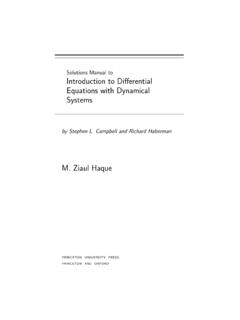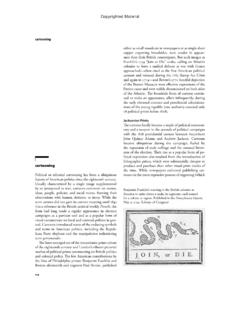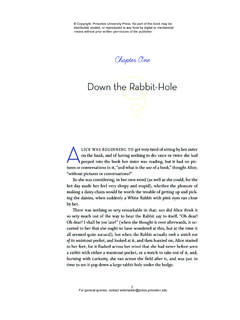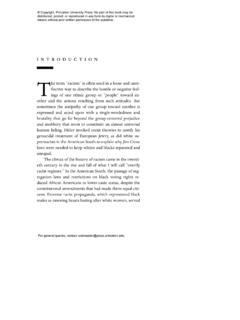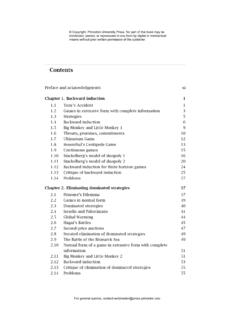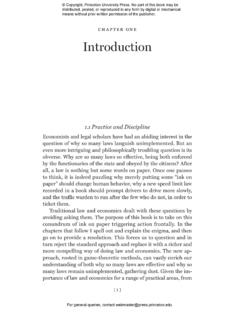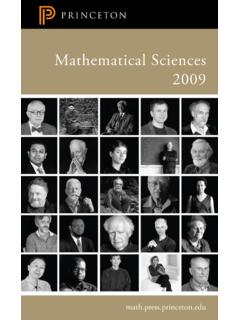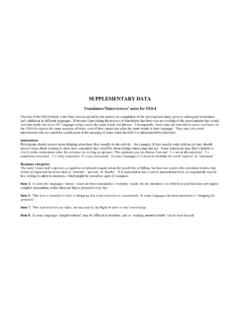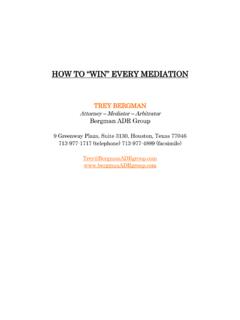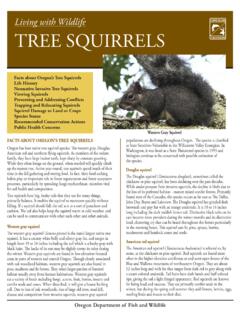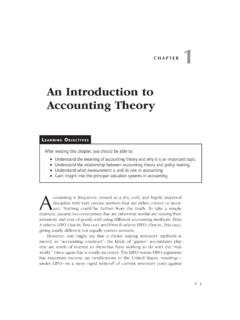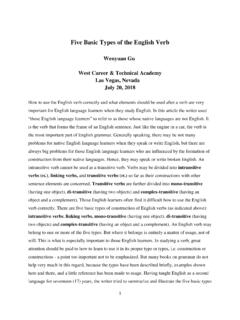Transcription of What Is Political Economy? - Princeton University
1 CHAPTER ONEWhat Is Political Economy? Economists must not only know their economic models,but also understand politics, interests, conflicts, passions the essence of collective life. For a brief period of time youcould make changes by decree; but to let them persist,you have to build coalitions and bring people have to be a politician. Alejandro Foxley, Chilean Minister of Finance([])quoted inWilliamson and INTRODUCTIONHow does politics affect economic outcomes? This question has beenasked probably as long as people have been interested in economics itself. From Adam Smith sWealth of Nationsin 1776 or perhaps the earlier until at least John Stuart Mill sPrinciples of Political Econ-omyin 1848, what we now call economics was in fact generally referredto as Political economy . 1 This terminology in large part reflected thebelief that economics was not really separable from politics. This was morethan an administrative classification of disciplines; it arose from thewidespread view that Political factors are crucial in determining economicoutcomes.
2 Hence, as a discipline economics historically viewed politicalforces not only as influencing economic outcomes, but often as a determin-ing the division of economics and Political science into distinct disci-plines, economists abstracted from Political and institutional factors. Thedesire for methodological progress and for a more rigorous basis foreconomic analysis were important motivations in this separation. Thedevelopment of neoclassical economics stressed optimization by consumersand firms subject to well-defined constraints and a market environment,1 .According to Groenewegen 1987 , the term Political economy for economics origi-nated in France in the 17th century. He attributes the first use to Montchretien in 1615. Sir .James Steurt 1761 was the first English economist to put the term in the title of a book oneconomics,An Inquiry into the Principles of Political economy . Copyright, Princeton University Press.
3 No part of this book may be distributed, posted, or reproduced in any form by digital or mechanical means without prior written permission of the publisher. For general queries, contact ONE4deliberately downplaying more amorphous Political factors. Those determi-nants of economic outcomes easily formalized in this choice-theoreticframework were stressed in the development of neoclassical economics;those not easily formalized were seen as largely the province of in the question of how politics affects economic outcomes maythus appear new to someone trained solely in modern neoclassical eco-nomics; in fact, it is not. One may want to keep the history of this interestin mind in assessing phrases such as explosion of interest or recentflood of work applied to current research in Political economy . Nonethe-less, looking at what has been happening in the past few years, suchphrases are quite accurate.
4 Of late, there reallyhasbeen an explosion inthe number of papers looking at the effect of politics on economicoutcomes. Leading journals are filled with articles on the Political econ-omy of one economic phenomenon or another; specialty journals havebeen started; conferences on a specific economic issue typically have atleast one paper on the politics of the issue, not to mention numerousconferences devoted solely to Political economy . In short, it appearsjustified to speak of the new Political economy as an important field ofcurrent research and to conclude that this is not simply a fad, but an areaof analysis that is here to short, Political economy falls into thatspecial class of things that seem quite old and musty and quite young andfresh at the same new Political economy is not, however, just a resurrection of anearlier approach to economics. Though characterized by a strong interestin the question of how politics affects economic outcomes, the newpolitical economy is defined more by its way of approaching this , it is defined in large part by its use of the formal and technicaltools of modern economic analysis to look at the importance of politics foreconomics.
5 Modern economic analysis is used not just in the formal senseof a mathematical approach; it is also conceptual, viewing Political phe-nomena in terms of optimization, incentives, constraints,et cetera. Hence,what really distinguishes the new Political economy is not so much thevolume, but the sort of research being technique sometimes clouds, rather than enhances, our under-standing of phenomena, and sometimes seems to be used as a substitutefor insights into the phenomenon being studied. The relative newness ofpolitical economy in its current form may make this problem more has led some people to the perception, incorrect in my opinion, that the2 One should , however, note that when asked to assess the significance of the FrenchRevolution, Chinese Premier Chou En-Lai is said to have replied, It is too soon to tell. 3 .For example, Alt and Shepsle 1990 defined Political economy as the study of rationaldecisions in the context of Political and economic institutions, stressing explicit microfounda-tions based on rational actors.
6 Copyright, Princeton University Press. No part of this book may be distributed, posted, or reproduced in any form by digital or mechanical means without prior written permission of the publisher. For general queries, contact IS Political Economy? 5new Political economy is simply a not very insightful formalization of theobvious. Recent research has also been criticized as being too broad, seenas trying to cover everything, with widely differing degrees of the strengths and the weaknesses of the new Political economysuggest the need for a more organized treatment. In this book, I not onlysurvey recent work on Political economy in macroeconomics, but alsoattempt to organize the work. As such, the approach is somewhere be-tween a textbook and a monograph. It is meant not only to summarize,organize, and critique the existing literature, attempting to guide thereader through the wilderness, but also, like a monograph, to present avery specific view of the field.
7 I argue that heterogeneity and conflict ofinterests are essential to Political economy and should be the organizingprinciples of the field. However, whether or not a reader finds himself inagreement with this point of view, he should find an organized treatmentof the field very useful. Those readers who do agree with the central roleof conflict of interests may thereby gain not only an understanding ofdifferent parts of the field, but also a better sense of how they fit POLITICS ANDECONOMICSWhat is the new Political economy ? A general definition is that it is thestudy of the interaction of politics and economics. Though such a vaguedefinition may have the virtue of being all-inclusive, it gives no real senseof what is being studied. It is like describing the taste of French cooking bysaying it results from the interaction of France and cooking. It is techni-cally correct, but one misses the real flavor.
8 Our first task, therefore, is toattempt to provide a definition that will indicate what makes a questionone of Political economy , and how Political economy differs from straight economics or from other areas of economics concerned with policy , for example, is Political economy different than the well-developedtheories of public finance and public economics? How does it differ fromthe theory of public choice?Some Preliminary Definitions .A famous definition of economics is that of Lionel Robbins 1932, p. 16 , Economics is the science which studies human behavior as a relationshipbetween ends and scarce means that have alternative uses. If economicsis the study of the optimal use of scarce resources, Political economybegins with the Political nature of decisionmaking and is concerned withhow politics will affect economic choices in a society. Society should bedefined broadly to include not only countries or other such jurisdictions,but also firms, social groups, or other organizations.
9 Copyright, Princeton University Press. No part of this book may be distributed, posted, or reproduced in any form by digital or mechanical means without prior written permission of the publisher. For general queries, contact ONE6 Obviously, we cannot go much further without being more precise aboutwhat we mean by the term politics. In the Political science literaturepolitics is defined as the study ofpowerandauthority, and the exercise of power and authority. Power, in turn, means the ability of an individual to achieve outcomes which reflect his objectives. Similarly, author-ity exists whenever one, several, or many people explicitly or tacitlypermit someone else to make decisions for them in some category of acts .Lindblom, 1977 , pp. 17 18 . Thus, for example, Lindblom defines politics .as the struggle over authority. As he puts it p. 119 , In an untidy processcalled politics, people who want authority struggle to get it while others tryto control those who hold it.
10 For our purposes, the most important part of these definitions is what isimplicit and taken for granted. Questions of power and authority arerelevant only when there isheterogeneity of interests, that is, aconflictofinterests between economic actors in a society. How then does a societymake collective policy decisions that affect it as a whole when individualmembers have conflicting interests? How do individuals, classes, or groupswithin a larger society gain power or authority to attempt to have thesocietal choice reflect their preferred course of action? Politics may bethought of generally as the study of mechanisms for making collectivechoices. Asking how power or authority are attained and exercised can bethought of as a specific form of the general question of what mechanismsare used to make collective this as a basis, we can return to the question of what politicaleconomy studies.
